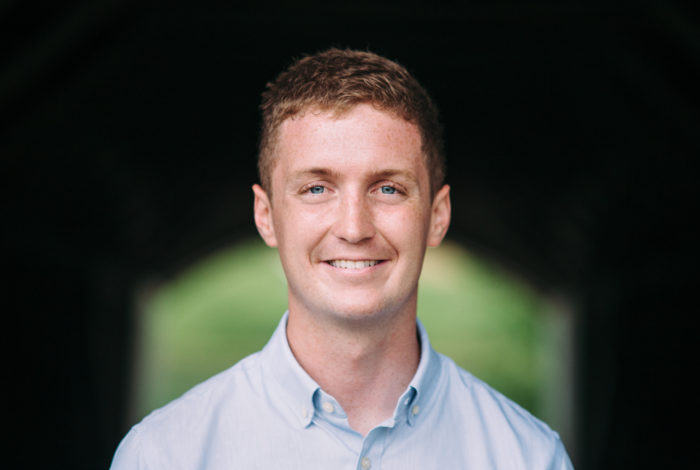Austin Frerick is building his Congressional campaign around the case against economic concentration, which he has called “the fundamental issue of our time.” His opening shot was a Des Moines Register guest column last month. In that piece, Frerick called for the federal government to block the proposed Monsanto-Bayer merger and break up “Big Ag corporations” that command near-monopoly power, “limiting farmers’ choices and making the products they need even more expensive.”
Frerick’s column provoked a response in the Register by the head of a conservative think tank, who defended the Monsanto-Bayer merger and questioned Frerick’s “political motivations.” At last week’s Iowa Wing Ding event and in a statement released today, the Democrat embraced this fight with “a right-wing organization” funded by the Koch Brothers and the American Legislative Exchange Council (ALEC).
Don Racheter’s response to Frerick appeared in the Register’s editorial pages on August 6, under the headline “Upcoming mergers benefit America’s farmers.” Whereas Frerick had argued opposing the Monsanto-Bayer merger was the key to saving rural Iowa from economic decline, Racheter wrote that “market-based problems need specific market-centric solutions,” which “can ensure our farmers have the tools to compete in any economic climate.”
More permanent partnerships, such as the potential merger between Bayer and Monsanto, will ensure that leading ag companies are able to invest additional resources to bring advanced solutions to farmers. Farmers will be able to spend less time and resources on daily challenges, enabling them to meet the international demand for Iowa’s ag products.
As opponents to mergers pop up as frequently as weeds after a strong rain, we should examine what might possibly be driving their motivation. Rather than truly believing that these mergers harm consumers, many are driven by political motivations. Case in point is the July 21 commentary by Austin Frerick [“To save rural Iowa, oppose Monsanto-Bayer mega-merger”], a little-known former U.S. Treasury economist under the Obama Administration. One can’t help but question Mr. Frerick’s perspective given his support for greater government interference in the marketplace while government investment in R&D has continued to decline.
Cloaking a progressive agenda behind a call for consumers to reject private sector investment by two leading ag companies with a stake in America’s farming future is both disingenuous and harmful.
Racheter doesn’t work in the agriculture sector. He’s founding president and chief operating officer of the Public Interest Institute, established at Iowa Wesleyan College in the early 1990s and now housed in Muscatine, sharing space with conservative groups such as Iowans for Tax Relief and the Tax Education Foundation.
The Public Interest Institute presents itself as “an independent, non-profit organization” promoting “the importance of a free-enterprise economic system and limited government in society based upon individual freedom and liberty.” It’s part of the State Policy Network, which unites “mini Heritage Foundations” in every state. A 2013 investigative report by the Center for Media and Democracy found, “Although many of SPN’s member organizations claim to be nonpartisan and independent, our in-depth investigation reveals that SPN and its member think tanks are major drivers of the right-wing, ALEC-backed agenda in state houses nationwide, with deep ties to the Koch brothers and the national right-wing network of funders, all while reporting little or no lobbying activities.”
Frerick was clearly delighted to be criticized by such a group. Speaking last Friday to hundreds of Democratic activists at the Iowa Wing Ding in Clear Lake, he drew applause by noting that within a week of his Congressional campaign launch, “a Koch-funded group published a response which actually argued that less choice helps farmers. And they called me a dangerous progressive with ties to Obama.”
Today Frerick’s campaign released this statement:
FRERICK SAYS FOCUS MUST REMAIN ON STRUGGLING FARMERS
CONGRESSIONAL CANDIDATE RESPONDS TO OP-ED BY PRESIDENT OF KOCH-FUNDED ORGANIZATION
WINTERSET – Austin Frerick issued a reply to Don Racheter, who criticized Frerick in an op-ed in the Des Moines Register last week.
Racheter, the President of the “non-partisan” Public Interest Institute, a right-wing organization funded by Charles and David Koch (the Koch Brothers) and the American Legislative Exchange Council (ALEC), criticized Frerick’s “progressive agenda” and alleged that he has ties to the Obama administration.Frerick backed up his recent editorial in the Des Moines Register, in which he called for the United States government to block the proposed merger of Monsanto-Bayer and to break-up Monsanto and other monopolies. “As small farms are feeling greater pressure from rising seed costs, Racheter has the audacity to argue that farmers would actually benefit from less choice,” Frerick said. “His dangerous, right-wing philosophy helps corporations at the expense of working people.”
Frerick continued, “I won’t be intimidated by the Koch Brothers. In fact, I welcome it. It means our message — of protecting farmers and consumers from abusive corporations — is connecting with the voters of the Third District.”
Racheter gained notoriety for his advocacy of the “birther” conspiracy and for adding a provision questioning President Obama’s citizenship into the official Iowa Republican Party platform while serving as Chairman of the Iowa Republican Party’s Platform Committee.
During the Iowa legislature’s dreadful 2017 session, one thing became clear: Democratic activists hate the Koch brothers and ALEC. The influence of conservative dark money on the Republican agenda was a frequent refrain on Iowa social media threads and popped up in questions at many weekend legislative forums.
Racheter’s target audience for his Des Moines Register op-ed was different from the voters who will choose Representative David Young’s opponent in the third Congressional district, of course. But with five to seven candidates likely to compete in the 2018 primary, Frerick has to hope “non-partisan” hacks on the right will continue to elevate his stature.

